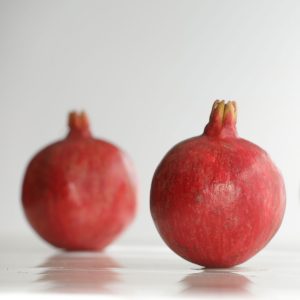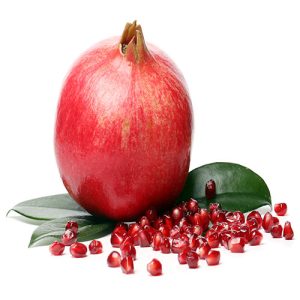Pomegrante
Impressive Anti-Inflammatory Effects
Long-lasting inflammation is one of the leading drivers of many killer diseases like heart disease, cancer, type 2 diabetes, Alzheimer’s disease and even obesity. Pomegranate has strong anti-inflammatory properties, which are mostly controlled by the antioxidant properties of the punicalagins.
Research in diabetics has proved that 250 ml of pomegranate juice on a daily basis for 12 weeks can diminish the inflammatory markers CRP and interleukin-6 by 32% and 30%, respectively. Hence, we can conclude that putting pomegranate in our diet is totally advantageous for anti- inflammatory problems.
Help Fight Prostate Cancer
Prostate cancer is the most common type of cancer in men. Laboratory research has indicated that pomegranate extract help to reduce cancer cell reproduction, and even induce apoptosis (cell death) in cancer cells. The PSA (prostate specific antigen) is a blood marker for prostate cancer.
Men whose PSA levels double in a short period of time are at growing risk of death from prostate cancer. Remarkably, human research proved that 237 ml (8 oz.) of pomegranate juice per day increased the PSA doubling time from 15 months to 54 months, which is enormous. Follow-up research found similar improvements using a type of pomegranate extract called POMx.
Relieve Stress
If pomegranate juice is consumed on a regular basis, stress level will be considerably decreased. Recent studies has proved the stress hormone cortisol has declined in those individuals served with pomegranate. Therefore, researchers reached to the conclusion that consumption of a sufficient amount of pomegranate can help ease the stress level.
Lower Blood Pressure
High blood pressure (hypertension) is one of the key roots of heart attacks and strokes.
In one research, people with high blood pressure had a substantial reduction after consuming 150 ml (5 oz.) of pomegranate juice daily for 2 weeks.
Other research has found similar effects, particularly for systolic blood pressure (the higher number in a blood pressure reading).
Anemia
Regular consumption of pomegranate in any form helps to maintain healthy blood flow in the body. Pomegranate supplies iron to the blood, therefore helping to decrease symptoms of anemia, including exhaustion, dizziness, weakness, and hearing loss.
Lower Risk of Heart Disease
Heart disease is currently the world’s most common cause of premature death. Punicic acid, the major fatty acid in pomegranate, would help protect against several steps in the heart disease process.
Research in 51 people with high cholesterol and triglycerides, 800 milligrams of pomegranate seed oil per day for 4 weeks was proved to considerably lower triglycerides and improves the triglyceride: HDL ratio.
Another research looked at the impacts of pomegranate juice on people with type 2 diabetes and high cholesterol. They noted significant reductions in LDL cholesterol, as well as other improvements.
Dental Care
One of the greatest virtues of pomegranates is that their juice, coupled with its antibacterial and antiviral properties, helps to diminish the effects of dental plaque and satisfactorily safeguards against oral diseases.
Diabetes
For diabetic patients, consuming pomegranate juice can help keep the risk of various coronary diseases at bay. Also, there is a significant decline in the hardening of the arteries, preventing the mounting growth of various heart diseases.
Help Fight Bacterial and Fungal Infections
Compounds in pomegranate help to fight detrimental microorganisms. They have been shown to be of benefit against some types of bacteria, as well as the yeast Candida albicans.
The anti-bacterial and anti-fungal effects might also be protective against infections and inflammation in the mouth. This includes conditions like gingivitis, periodontitis and denture stomatitis.
Help Improve Memory
recent evidences proved that pomegranate can improve memory. In one research in surgical patients, 2 grams of pomegranate extract prevented shortfalls in memory after the surgery.
Another research in 28 elderly individuals with memory complaints found that 237 ml (8 oz.) of pomegranate juice per day considerably improved markers of verbal and visual memory.
There is also some proof from studies in mice that pomegranate can help fight Alzheimer’s disease.
Ageing
Ageing is a common issue which is increasing among people living in urban cities because of stress, pollution, UV radiation and lack of nutrition. These are the most common problem that leads to the production of free radicals in the body. But antioxidants help to neutralize these free radicals and protect skin from ageing. Pomegranates are not only effective in protecting from ageing, but it also nourishes the skin.
Help Fight Arthritis and Joint Pain
Arthritis is a common issue in Western countries and among other nations. There are many different types, but most of them include some form of inflammation in the joints. Considering that the plant compounds in pomegranate have anti-inflammatory effects, it is crystal clear that they could help treat arthritis.
Remarkably, laboratory researches have indicated that pomegranate extract can block enzymes that are known to damage joints in people with osteoarthritis.
| Calories 234 | Calories from Fat 30 |
| % Daily Value* | |
| Total Fat 3.3g | 5% |
| Saturated Fat 0.3g | 2% |
| Trans Fat 0g | |
| Polyunsaturated Fat 0.2g | |
| Monounsaturated Fat 0.3g | |
| Cholesterol 0mg | 0% |
| Sodium 8.5mg | 0% |
| Potassium 666mg | 19% |
| Total Carbohydrates 53g | 18% |
| Dietary Fiber 11g | 44% |
| Sugars 39g | |
| Protein 4.7g | |
| Vitamin A | 0% |
| Vitamin C | 48% |
| Calcium | 2.2% |
| Iron | 4.7% |
| *Percent Daily Values are based on a 2000 calorie diet. | |
| Reference: www.nutritionix.com | |





